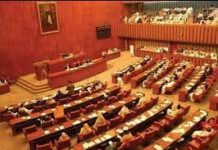ISLAMABAD: Imran Khan government’s Task Force on Civil Service Reform, after two years consultations with more than 3,000 participants from all walks of life holding 68 sessions throughout the country, had developed a comprehensive set of recommendations for modernising the civil service structure, processes and incentives. However, most of the reform proposals despite the cabinet’s approval remained unimplemented during the PTI government. A major reform to cleanse the bureaucracy of deadwood was though implemented, it was later reversed by the last PDM government.
However, most of the reform proposals despite the cabinet’s approval remained unimplemented during the PTI government. A major reform to cleanse the bureaucracy of deadwood was though implemented, it was later reversed by the last PDM government.
Now the present government’s civil service reform committee is considering introducing reforms, similar to those of PTI government. Dr Ishrat Husain-led Task Force on Civil Service Reform had proposed the overhaul of the present CSS competition scheme. The Task Force had recommended to introduce preliminary screening test, domain specific cluster-based exam, psychometric evaluation, structured interviews and system automation. It was not implemented by the PTI government. The Task Force had also proposed new training scheme for the civil servants. It was recommended that middle career management and senior management courses to be split in general management and specialised training courses. It was implemented. However, the proposal regarding reorganisation of specialised training institutes and mandatory training for ex-cadre and non-cadre civil servants was not implemented. In regard to performance management, it was proposed to replace the subjective ACR system by an objective PER with goals specified and key performance indicators agreed with the reportee. Performance agreements between the PM and ministers were signed but the application of the new system to the civil servants remained unimplemented although the new proformas were designed.
The old system of seniority-cum fitness was replaced by a quantitative evaluation of each candidate’s performance, training outcomes.
assessment of potential and integrity by a selection board.






















